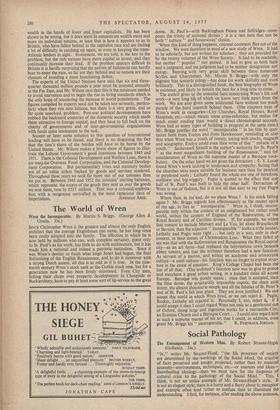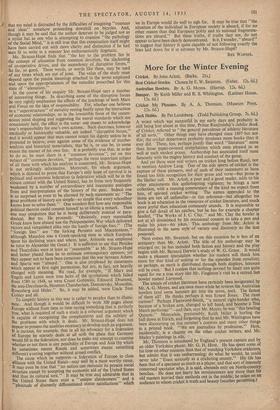Social Pathology
The Estrangement of Western Man. By Robert Strausz-Hupe. (Gollancz. 16s.) "IF," writes Mr. Strausz-Hup6, "the life processes of society are determined by the workings of the Social Mind, the crucible of facts perceived and images projected, rather than by material necessity—environments, techniques, etc.—or essences and ideas— freewheeling ideology—then we must turn for the diagnosis of cultural crisis to the pathology of the Social Mind." This, I think, is not an unfair example of Mr. Strausz-Hupe's style. It is not an elegant style; there is a hurry and a flurry about it; metaphor and example often tend rather to confuse than to illuminate the understanding. I find, for instance, after reading the above sentence, that my mind is distracted by the difficulties of imagining "essences and ideas" somehow proceeding downhill on bicycles. And, though it may be said that the author deserves to be judged not as a stylist but as one who is attempting to examine "the pathology of the Social Mind," it is still true that this examination itself might have been carried out with more clarity and distinction if he had seen fit to write in a manner less enthusiastically dogmatic.
Mr. Strausz-Hup6 finds that "the key to the problem lies in the concept of alienation from common devotion, the slackening of co-operative drives, and the ascendency of disruptive forces." So far, so good. These words, or words like these, may be used of any times which are out of joint. The value of the study must depend upon the precise meanings attached to the terms employed and upon the appropriateness of the remedies prescribed for this state of "alienation."
In the course of his enquiry Mr. Strausz-Hupe says a number of interesting things. In describing some of the disruptive forces he very rightly emphasises the effects of the teachings of both Marx and Freud on the idea of responsibility. For, whether one believes in a "superstructure" of morality resting finally upon the interaction of economic relationships, or in the irresistible force of the uncon- scious mind shaping and suggesting the moral standards which are consciously held, the effect is the same: one ceases to acknowledge one's responsibility for one's own actions. Such doctrines, however medically or historically valuable, are indeed "disruptive forces," and it would appear that man cannot retain his dignity -unless he is prepared to believe, even against some of the evidence of psycho- analysts and historical materialists, that 'he is, or can be, to some extent the master of his own fate. It is probably true that, in order to do so, he must share in a "common devotion"; yet on this subject of "common devotion," perhaps the most important subject of all those with which his analysis is concerned, Mr. Strausz-Hupe is not strikingly informative. Moreover, his whole argument, which is directed to prove that Europe's only hope of survival is in political and economic federation (a federation which will be in the closest contact with the United States), has its force very frequently weakened by a number of extraordinary and inaccurate analogies from and interpretations of the history of the past. Indeed one is so surprised as even to be alarmed by such statements as: "The great problems of history are simple—so simple that every schoolboy knows how to solve them." One wonders first how any responsible political theorist could commit himself to so idiotic a remark. Then one may conjecture that he is being deliberately ironical or para- doxical. But no. He proceeds: "Obviously, every reasonable Greek knew how absurd was the Peloponnesian War which delivered victors and vanquished alike into the hands of foreign foes:" (The "foreign foes" are "the lurking Persians and Macedonians," although Macedon was a Greek-speaking state in which Euripides spent his declining years and where, later, Aristotle was employed as tutor to Alexander the Great.) It is sufficient to say that Pericles and Thucydides were at least as "reasonable" as Mr. Strausz-Hupe and better placed than he to estimate contemporary opinion; yet they appear not to have been conscious that the war between Athens and Sparta was "absurd." One is also perplexed by statements which appear at first sight portentous, but are, in fact, not heavily charged with meaning. We read, for example, "If Marx and Engels and Lenin were true heirs of the revolutions which failed from 1789 to 1848, so were Count Gobineau, Edouard Drumont, the anti-Dreyfusards, Houston Chamberlain, Dostoievsky, Mussolini, Rosenberg and Hitler." So, it may be added, were Uncle Tom Cobley and all. To simplify history in this way is rather to perplex than to illumi- nate. And though it would be difficult to write 300 pages about Europe without from time to time saying something that is perfectly true, what is required of such a study is a coherent argument which Is capable of recognising the complications and the subtlety of the problems with which it deals. Mr. Strausz-Hupe does not appear to possess the qualities necessary to develop such an argument. It is curious, for example, that in all his advocacy for a federation of Europe he scarcely deals at all with the place that Germany Would fill in the federation, nor does he make any attempt to examine Whether or not there is any possibility of Europe and Asia (by which he sometimes means Russia and sometimes means something different) existing together without armed conflict. The cause which he supports—a federation of Europe in close alliance with the United States—may well be a most worthy cause. It may even be true that "no nation can maintain its present social structure except by accepting the economic aid of the United States and thus its cultural writ." It may be true and admirable that in the United States there exist a "unique classlessness" and a "plenitude of discreetly differentiated status satisfactions" which we in Europe would do well to sigh for. It may be true that "the situation of the individual in European society is absurd, if for no other reason than that European polity and its national fragmenta- tions are absurd." But these truths, if truths they are, do not appear to have been clearly demonstrated. It it, I wonder, "absurd" to suggest that history is quite capable of not following exactly the lines laid down for it in advance by Mr. Strausz-Hupe?
REX WARNER.



































 Previous page
Previous page